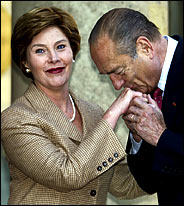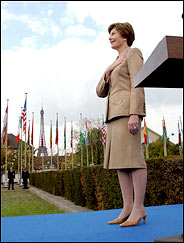

 |
| Reuters |
| U.S. first lady Laura Bush (L) is welcomed by French President Jacques Chirac at the Elysee Palace, September 29, 2003. Laura Bush is in Paris to represent the United States in a ceremony marking the U.S. reentry to UNESCO, the United Nations' main cultural organization, from which Washington withdrew in 1984. |
 |
| Associated Press |
| Laura Bush during the playing of "The Star-Spangled Banner" as the United States flag was raised at Unesco headquarters in Paris. |
PARIS, Sept. 29 — For White House planners, the image had to be picture perfect: the first lady, the American flag and the Eiffel Tower all in the same photo frame.
So when Laura Bush raised the American flag today to signal the return of the United States to Unesco after a 19-year boycott, there was nothing subtle about the symbols.
Her five-day trip to Paris and Moscow is seen as part of a campaign to dispel criticism of her husband's administration as unilateralist as it seeks to win international support donewith a new United Nations resolution for more money and troops for the American occupation of Iraq.
In her 25-minute address inside the headquarters of the United Nations Educational, Scientific and Cultural Organization, Mrs. Bush proclaimed that Unesco could "help achieve peace by spreading the values that will help defeat terror and lead to a better and safer world: education, tolerance, respect for human life and respect for each other's differences."
Part of her speech focused on what she characterized as the administration's achievements in postwar Afghanistan and Iraq, including reopening schools. "As the civilized world stands against terror, Unesco's work can make an enormous difference," she said.
The Reagan administration withdrew from Unesco in 1984, charging that it had become a forum for spreading anti-American propaganda and was chronically mismanaged and corrupt. The agency lost the American contribution — a quarter of its budget.
Koichiro Matsuura, the soft-spoken Japanese diplomat who has been Unesco's director general since November 1999, has shaken up and slimmed down the bureaucracy, finally convincing Washington that Unesco was worthy of rejoining.
After her speech, in the courtyard, Mrs. Bush stood ramrod straight, her hand on her heart, as the mezzo-soprano Susan Graham sang "The Star-Spangled Banner" and the American flag was raised to join the flags of the 189 other members.
But Mrs. Bush did not face the flag as the anthem was sung; instead, she stood perpendicular to it, enabling photographers to capture her in profile, with the flag and the Eiffel Tower behind. The scene was carefully planned for days by a White House advance team, much to the amusement of longtime Unesco employees.
Mrs. Bush, on her third solo trip abroad as first lady, also tried to burnish America's image in the eyes of France and to assure her hosts of her country's friendship.
"We can have disagreements and remain friends," she said in an interview with France 3 television that was shown today. "Our attachment is very emotional."
Recalling that last year she and Mr. Bush visited the graves of American soldiers killed on the Normandy beaches in World War II, she described the friendship between France and the United States as "intimate and intense at the same time."
Early in the day, President Jacques Chirac welcomed Mrs. Bush for a 30-minute meeting at Élysée Palace. Not one to be outdone by a photo opportunity, he kissed her hand in front of cameramen and photographers as she emerged from her limousine.
It was just a year ago that Mr. Bush announced to the United Nations General Assembly that the United States would rejoin Unesco.
But for Representative Tom Lantos of California, the ranking Democrat on the House International Relations Committee and a member of the visiting American delegation, it was a Congressional, not an administration, initiative that brought America back.
"This is sort of my baby," he boasted in a telephone interview, saying that in May 2001 he and Representative Jim Leach, Republican of Iowa, successfully pushed for passage of an amendment to an authorization bill directing Mr. Bush to rejoin and authorizing $60 million for America's assessment. "I explained to the administration that at a time when it was being accused of being unilateral, nothing could be more helpful in helping its image than rejoining."
For re-entry into the club, which will take effect on Oct. 1, the United States has pledged to pay a one-time deposit to the capital fund of $5 million and $82 million of the total $577 million budget for 2003 and 2004.
Mrs. Bush's 17-member delegation included Louise V. Oliver, the Republican fund-raiser nominated by the administration to be ambassador to Unesco, and some of Mrs. Bush's best friends from Texas, including Adair Margo, an El Paso art dealer who heads the White House committee on the arts and humanities. Ms. Graham, the singer, is from Mrs. Bush's hometown of Midland, Tex.
The choice of Ms. Oliver, a staunch conservative, as ambassador may indicate the direction the Bush administration wants Unesco to take. She is the former president of Gopac, the Republican political advocacy organization, worked in the White House personnel office in the Reagan administration, and was the first President Bush's commissioner of the National Council on Children.
Despite concerns among some Democratic lawmakers that she may be too politically extreme for the post, she is expected to win easy Senate confirmation. Asked about the wisdom of her appointment, Mr. Lantos declined public comment.